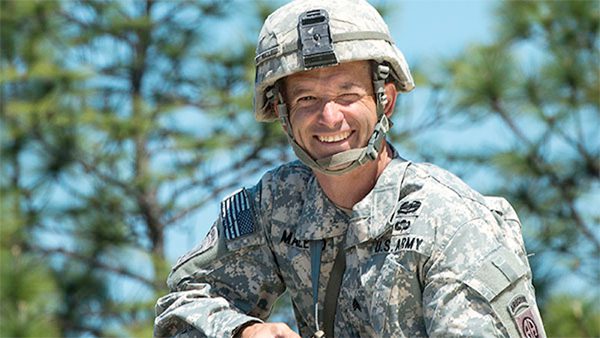Life through the lens of Army photojournalist Mike MacLeod

“When you’re a writer, life’s a smorgasbord,” says Mike MacLeod ’89.
From tracking grey wolves in Montana, to starting his own magazine, to serving the United States Army, to writing a memoir about his time in the Middle East, MacLeod ’89 has been busy.
After graduating from Furman with a B.S. in biology, MacLeod moved to Missoula, Montana, where he earned his master’s in wildlife biology while living in a cabin in the woods with no running water or electricity. At the time, grey wolves were endangered, and scientists planned to reintroduce them into the Lower 48 States. The animals were already coming in naturally from Canada, and on cross-country skis, Macleod tracked them and their prey to study the effect this reentry had on other animal populations. He had already spent ten weeks studying grey wolves in Montana before his senior year at Furman and had written his senior paper on the project. A year into his postgraduate research, MacLeod’s wife, Barbara MacLeod ’90, joined him as a field tech. “We planned our wedding around the elk calving that year,” he remembers cheerfully.
MacLeod has a long history displaying passion for the outdoors. While at Furman, he took elective classes in field botany and zoology, helped start the campus-recycling program, and revived the University’s outdoor club. After receiving his master’s, MacLeod became more interested in writing and photography, and opened his own studio in Greenville. When one of his previous Furman professors went on sabbatical, MacLeod filled the temporary teaching position at Furman for two years, and his students named him the best new teacher of the year.
Following his time in the classroom, MacLeod started his own outdoor magazine, River. In a time before the Information Age had truly begun, he wanted to share his love of the outdoors with others in a more fact-based way than much of the lore-filled hunting and fishing magazines did. He ran the magazine for nearly three years until River was sold just prior to the September 11 terror attack.
The magazine industry took a hit following the terrorist attacks, so MacLeod sold River and moved back out to the cabin in Montana with his wife and two young children. When he wasn’t spending time with his family or working in forestry, MacLeod wrote. His short story “Horn Hunter” was published in the 2011 edition of the anthology The Best of the West.
When his kids were old enough to go to school, MacLeod and his wife moved out of the cabin but stayed in Montana. It was in these years that one of MacLeod’s good Furman friends, Tom Clark ’88, called him from Iraq during the beginning of the War on Terror. MacLeod was struck by how different Clark’s stories clashed with media portrayals of American soldiers in the Middle East.
In addition to writing and biology, MacLeod already had a longstanding interest in the military. While at Furman, several of his closest friends were part of the ROTC program. At 35, he had even considered joining the Army, but because his kids were still young he decided against it. Then, when he was 40, the age of enlistment was raised to 41, and MacLeod decided to enter the Army as a photojournalist. “I knew two good people who were giving all their efforts to the Army. I decided to tell the soldiers’ stories so people back home could learn about their experiences.”
“I’m a firm believer that if you want to understand something you have to do it,” says MacLeod, calling on his biology background as he compares his thought process to how scientists approach research in the lab. “Nothing happens in a vacuum—if you want to understand something, you need to look at all the reasons involved.”
In 2008, MacLeod moved to Fort Bragg, North Carolina, to join the 82nd Airborne Division of the United States Army. “Because of the danger and difficulty of maintaining airborne status, the people there are extremely motivated individuals, and I wanted to go to war with the best troops possible.”
In addition to all the other heavy gear, weighing up to a hundred pounds, MacLeod needed two hooks on his uniform: one for his gun and one for his camera. “I had a rule: if I’m in a firefight and I can see the enemy, I shoot. If I can’t, I use my camera. But my first priority was always the other guys. And really it just came down to common sense whether I reach for my rifle or camera.”
“I learned not just how to serve the Army as an institution, but how to serve people. The Army teaches you to reduce your opinion of yourself, but not in a negative way. It’s about working together as a group in shared sacrifice.”
MacLeod began collecting notes back in basic training, and between his time in Iraq from 2009-2010 and Afghanistan from 2012-2013, he filled twelve notebooks with his experiences and those had by other soldiers.
Even when on break from fighting overseas, MacLeod had little leisure back in the U.S. “The Army does two things: fighting and training. It’s important for the Army to cross train . . . People get moved around to new positions as the force gets reshuffled.” During the small amount of free time while in the United States, MacLeod spent time with his family, so most of the writing for The Brave Ones took place when he returned home from Afghanistan in 2013.
“My job was to tell the soldiers’ stories. I was interested in letting civilians back home see the big picture, especially so that families could feel good about what their loved ones are doing. As long as it doesn’t negatively impact national security, Americans deserve to know as much as they want about what we’re doing overseas.”
View some of Mike MacLeod’s images here.